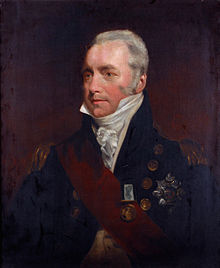Richard Goodwin Keats
| Sir Richard Goodwin Keats | |
|---|---|

Admiral Sir Richard Goodwin Keats (1757-1834) © National Maritime Museum, Greenwich, London
|
|
| Born | 16 January 1757 Chalton, Hampshire, England |
| Died | 5 April 1834 (aged 77) Greenwich Hospital, Greenwich, London, England |
| Allegiance |
|
| Service/branch |
|
| Years of service | 1770–1812 |
| Rank | Admiral of the Blue |
| Commands held |
HMS Rhinoceros HMS Bonetta HMS Southampton HMS Niger HMS London HMS Galatea HMS Boadicea HMS Superb HMS Ganges Governor of Newfoundland |
| Battles/wars |
|
Admiral Sir Richard Goodwin Keats (16 January 1757 – 5 April 1834) was a British naval officer who fought throughout the American Revolution, French Revolutionary War and Napoleonic War. He retired in 1812 due to ill health and was made Commodore-Governor of Newfoundland from 1813 to 1816. In 1821 he was made Governor of Greenwich Hospital in Greenwich, London. Keats held the post until his death at Greenwich in 1834. Keats is remembered as a capable and well respected officer. His actions at the Battle of Algeciras Bay became legendary.
Keats was born at Chalton, Hampshire the son of Rev. Richard Keats, Rector of Bideford and King's Nympton in Devon and Headmaster of Blundells School, Tiverton, by his wife, Elizabeth. His formal education was brief. At the age of nine, in 1766, he entered New College School and was then admitted briefly to Winchester College in 1768 but lacked scholastic aptitude and determined on a career in the Royal Navy.
Keats entered the navy as a midshipman in 1770 aboard the 74-gun HMS Bellona under Captain John Montagu and followed Montagu when he was promoted rear-admiral, given command of the North American Station and the governorship at Halifax. He served in a number of ships on the Newfoundland station under his patron and his patron’s son Captain James Montagu.
...
Wikipedia
